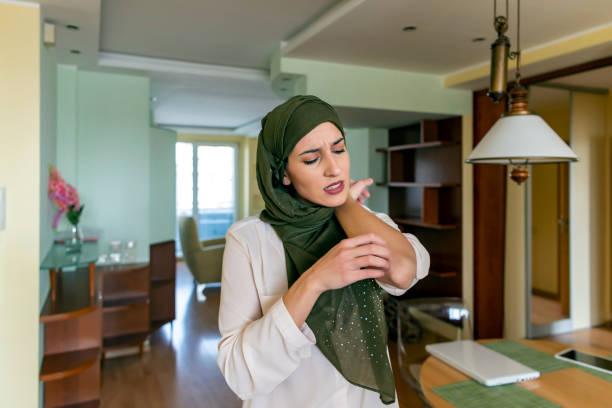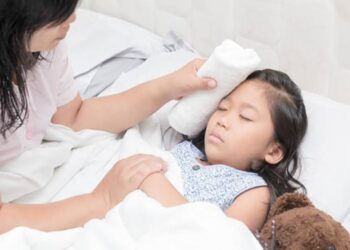
Do you have itchy skin almost immediately after taking your bath? Does it occur every time you take your bath? And has it persisted for a long time despite several interventions? Here, you will see practical and effective ways to stop having itchy skin after bathing. I have revised this post several times to update it with newer information.
First of all, I am a medical personnel (a final year medical student at the time of revising this post) and what I am going to show you here will be based on my knowledge of medicine and the human body.
Before we continue, it is important to ask the following questions:
- Why do I have itchy skin after taking a bath?
- What is probably causing it?
- And how can I prevent it from happening?
There is every likelihood that this itching skin you notice after taking a bath did not start at your birth. It started somewhere along the long as you age, or following a change in environment. And if that is the case, you may benefit from what you will find here. You may have tried several things, or even visited the hospital several times to no avail. But what you will see here is that the solution is cheaper than you thought.
Why do you have itchy skin after bathing
In medicine, the first thing we try to do when any patient presents to the clinic is to find a diagnosis. That is, we need to identify what the cause is before prescribing treatment. This initial step of diagnosis is very important, such that if missed, can result in treatment failure or damage to other organs of the body not previously affected by the condition.
In the case of itchy skin, however, the cause can be hard to establish without a thorough physical check on the patient. What I am going to do here it to look at the common possible causes of itchy skin after bathing, but if you are living in the tropical regions (Subsaharan Africa, Parts of South America, North America, Asia; where temperatures are usually high in most parts of the year), I can provide a most probable cause for why you are having itchy skin immediately after taking you bath.
Cause #1: Dry Skin
Dry skin is probably one of the commonest reasons why people experience itchy skin after taking a shower. This might apply to you too. Having dry skin means your skin does not produce as much oil/sebum as other people. It is perfectly normal and natural but it is not without its own issues.
The skin is a protective layer covering the entire body surface, and for it to perform its functions perfectly, it requires several apparatus known as skin appendages, including hair follicles, sebaceous oil-producing glands, and sweat glands.
When the skin is too dry, it becomes irritable. Nerve endings in the skin become more sensitive to the atmosphere, air, and other small objects coming in contact with the skin. This is primarily because the skin is unable to prevent particles from breaching its outermost part as effectively as it would if adequate oil was produced and secreted.
The skin itching in someone with dry skin can be worsened after taking a bath. This is because when you take a bath, you further wash off the little oil on the skin prior to bathing. At first, when the skin is still wet, you might not experience the itchiness, but a few seconds after your skin dries, then would your skin begins to itch.
Cause #2: Hypersensitive Skin
If you are allergic, asthmatic, or you have a family history of any of these, this could be the reason why you experience itchiness in your skin after taking your bath. Skin hypersensitivity is a natural occurrence in people described as abnormal skin reactions to normal particles that should not elicit any reaction.[1]Allergic contact dermatitis: Overview – NCBI Bookshelf
The mechanism involves the body’s inability to differentiate harmless particles from harmful ones, thus, mounting an immune response against seemingly harmless particles, as it would for invading organisms of pathogens.
How do you know you have hypersensitive skin? It’s not hard to know. If you have ever experienced reddish bumps/rashes on your skin after you make contact with something that does not cause such reactions in other people, you might be having hypersensitive skin. In severe cases, a mere drawing of any object, metal, or non-metal on the skin would create visible patterns of wheels/reddened skin in some people.
Immediately after taking your bath, hypersensitive skin can begin to itch at varying severity from individual to individual. This occurs because you may have scrubbed the skin and applied soaps that may cause it to react in a way it should not.
Cause #3: Buildup of skin irritants
While I’d go on to list several causes of skin itching after taking a bath, this is one of the most probable reasons why you experience itchy skin after taking your bath. Your skin is also an excretory organ. It excretes sweat containing nitrogenous waste products like urea. The skin also picks up dirt, and other chemicals from the environment. These may accumulate and irritate the skin over time.
People who live in hot climates and bathe less than two to three times a day are more likely to experience itchy skin following bathing. This is because leaving the skin unwashed for so long results in the movement of the particles of dirt, and lotion, mixed with sweat, back into the skin pores, which may cause certain changes there. Over time, this can even provide a nidus for fungi and other commensal organisms to thrive on the skin, thus provoking excitatory reactions that you see as skin itching.
Cause #4: Hard water
Hard water is a term used for water that has a high quantity of calcium or magnesium deposits, with calcium deposits being more implicated in causing itchiness of the skin after taking a bath. Hard water, due to its constituents, resists washing soap such that it may require a larger quantity of soap or detergent to cause adequate lather or foam.
Hard water causes itchy skin after taking a bath through almost the same mechanism as hypersensitivity, as the calcium deposits on the skin can irritate the skin’s nerve endings. Also, calcium can precipitate with other substances in the water and soap to form more irritative complexes that may cause you to itch after taking a bath in hard water. It can also alter the ph of the water.
Hard water can be found in normal borehole tanks, swimming pools, treated water, and the rest. So, in the absence of other causes of skin itching after taking a bath, water hardness could also be considered.
Cause #5: Aquagenic Urticaria
This is also known as a water allergy. It occurs when there is an allergic reaction to water, just like one would react to hay or pollen when asthmatic. Aquagenic urticaria is a rare medical condition with only about 50 cases reported throughout the medical literature. [2]Acquagenic Urticaria – Science Direct
However, in those that have it, this condition can be very devastating as it can cause severe skin itching immediately after taking a bath. Shelley and Rawnsley who first described this condition referred to it as a clinical finding of wheels on the patient’s skin within 30 minutes after contact with water of any source or temperature, which can last from between 30 minutes to 2 hours after halted exposure to water. It was also reported to develop more on the trunk and upper extremities.
The exact mechanism of aquagenic urticaria and how it causes wheels and itching on the skin after contact with water is not clearly known, however, Shelley and Rawnsley hypothesized that it could be due to some interactions between water molecules and sebum produced from the sebaceous glands, to trigger perifollicular mast cell degranulations which release histamine and stimulate an allergic reaction.
How to stop having itching skin or stop skin reactions after bathing
Identifying the specific reason why you have itchy skin after taking a bath is important in stopping the skin reactions/itching, or preventing a recurrence at another time. You might be going through a tough time each time you think about taking your bath because of how your body itches after doing so. Here, I will focus on specific treatments and solutions for your itchy skin after taking a shower.
How to stop itchiness caused by dry skin
To confirm if you have dry skin, pinch your skin with two fingers and rub gently against the skin fold between your fingers. Observe how your skin feels between your fingers if it is dry, or soft, or if you could feel a lot of oily substance on the skin’s surface. Release the pinch after a few seconds and inspect the skin area previously pinched. If you have dry skin, you would feel a dry texture and see a whitish dusty crust after releasing the pinch or if you scratch it lightly.
No matter how oily your skin feels, you still need to regularly keep it moist by using a generous amount of moisturizer lotions, especially those with proven efficacy. There are several brands out there, but I will not promote any here at this time.
Other things asides from using an effective moisturizing cream after bathing include;
- Take shorter baths.
- Avoid scrubbing skin too hard as this may evoke mild inflammatory reactions.
- Use a milder soap or cleanser, to avoid washing off too much oil secreted by your skin.
- Consider bathing without a sponge for a few weeks.
How to stop skin itching after a bath, caused by hypersensitivity
It’s quite easy to identify skin itching after bathing that is caused by hypersensitivity. There is either a family history of atopy or allergies like asthma, or you have this condition yourself. It is also important to identify the specific substance you may be reacting to. It could be some chemicals from your water source, or due to water hardness as mentioned earlier.
General solutions to itchy skin due to hypersensitivity include the following:
- Identify what triggers the reaction by reflecting on what may have contaminated the water before you used it.
- The use of antihistamine drugs may relieve skin itching for a short time, but they must be taken a few minutes before you have your bath to allow enough time to begin their action.
- Application of corticosteroid creams to your skin after bathing.
How to stop skin itching caused by material buildup
There is no easier way to put this, it probably means you are bathing less than you should. An average of two to three baths per day are recommended for every adult to keep their body clean, cool, less sweaty, and attractive to others. Failure to bathe adequately has been linked to skin itching when next you take your bath.
Other materials not related to the adequacy of bathing could also build up on your skin depending on the weather condition. These could be dust, smoke, fumes, and other irritants. The simple solution to this is to bathe more regularly and apply a good lotion and antiperspirants to your skin and sweaty areas respectively.
Also, ensure to wash your towels and toiletries regularly, and avoid sharing towels and scrubs.
How to stop or prevent skin itching caused by hard water
If you suddenly started noticing itchy skin after taking your bath, you can suspect that it could be caused by water hardness if the following are true:
- You see particles or lumps in your water.
- You have not washed your water for a while.
- You use excess soap when you wash clothes with water.
These would likely indicate that your water is getting hard, and you need to find ways to soften it. Certain swimming pool water is hard due to the chemicals, and some people would complain of skin itching after using such pools.
Solutions to this type of skin itchiness include the following:
- Boiling water before bathing could reduce water hardness, especially for “temporary hard water”. This would precipitate calcium and magnesium deposits to settle at the bottom of your water container.
- Wash your tank, and do so regularly.
- Use a water filter/tank filter and water softeners between your tank and tap endpoints. This help reduces impurities and hardness.
- Soda ash or washing soda has been proven to help in softening water before bathing. Put a calculated amount of soda ash into your bathing water, or titrate it carefully at incremental doses if you don’t know how to calculate the proportion of soda ash.
If severe enough, you can combine these treatments with the use of antihistamines or corticosteroids for a very short time.
Stopping skin itching after bathing that is caused by aquagenic urticaria
If your skin itching is due to aquagenic urticaria, you definitely would have been experiencing it for such a long time as you can remember, not necessarily from birth. Following the diagnosis of aquagenic urticaria by your doctor, he would prescribe you some medications that have been noted to be effective in treating this condition.
The treatment interventions for aquagenic urticaria include;
- Use of long-acting antihistamines.
- Topical barrier treatment with water-repelling gels; gels that prevent water from entering your skin when applied on your skin.
- Treatment with Omalizumab (a monoclonal antibody) has proven to be very effective in treating patients with aquagenic urticaria.
Other Important Causes of Skin Itching
- Chlorine Rash: For skin itching caused by chlorine rash results from the presence of excess chlorine in the water. The skin lesions may later form blisters and rupture, draining fluid from them.
- Cold Urticaria: Cold urticaria is a form of skin allergy or hypersensitivity that results from excessive exposure to cold water or air. Cold has been scientifically linked to the causation and/or aggravation of allergic reactions or urticarias.
- Chronic organ disease (liver failure, renal failure): Chronic organ failure can result in the accumulation of metabolites that should have been excreted by these organs, eg, urea, creatinine, ammonia, etc. These can accumulate on the skin and trigger skin irritation and itching.
- Drug reactions: Some drugs e.g sulphonamides, cause itching in some people. This is because of the accumulation of toxic byproducts by these drugs on the skin.
General hygiene principles for preventing skin itching after a bath
As mentioned, the commonest causes of skin itching after a bath are related to poor skin hygiene. These hygiene principles are important in preventing skin itching that occurs after you have a bath.
- Bathe regularly, at least 2-3 times daily, especially if you are in the tropics.
- Regularly wash your towel and sponge.
- Avoid keeping your towel damp for a long time.
- Bathe with clean and non-slippery water.
- Avoid sharing towels and sponges as much as possible.
Conclusion
Having skin itching after bathing can make every bath a very demoralizing experience. You may even want to avoid bathing altogether, but I hope this guide has given you more insights into the problems causing skin itching after you take your bath.
Sometimes, you need to bathe more, other times, you need to get some supporting medications, yet other times, you need to see the doctor to help identify the underlying cause of your skin itching.
References
















